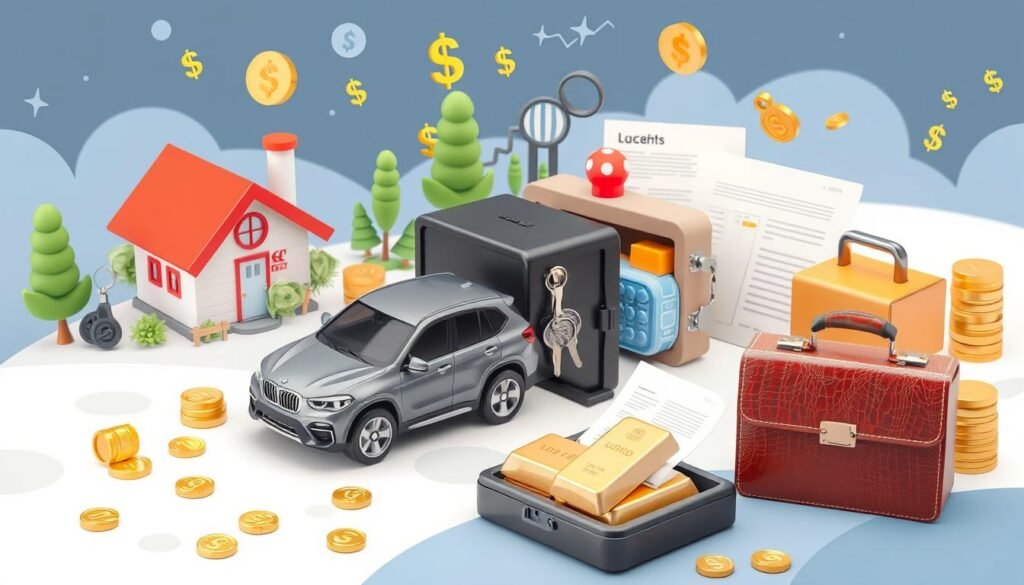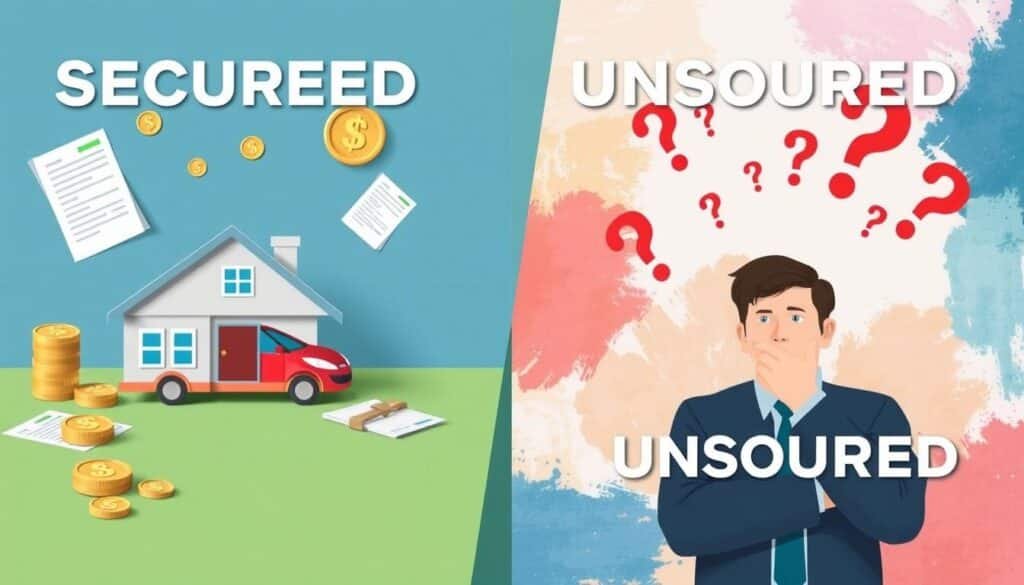Secured loans are a favorite among those looking for flexible and affordable ways to borrow money. These loans need collateral like a car or home. They offer many benefits that make them a great choice over unsecured loans. Let’s dive into the top 10 advantages of secured loans and how they can help borrowers.
Key Takeaways
- Secured loans usually have lower interest rates than unsecured loans, making them cheaper for borrowers.
- With secured loans, you can borrow more money, giving you more financial freedom.
- These loans often have longer repayment periods, helping you manage your finances better.
- Because secured loans are seen as less risky, lenders are more open to approving them, even for those with lower credit scores.
- Secured loans can be used for many things, like mortgages, auto loans, and business financing, offering a wide range of options.
Understanding Secured Loans: Definition and Basic Concepts
Secured loans are a type of debt backed by an asset the borrower owns. The lender puts a lien on this asset until the loan is paid back. This asset, like real estate or cars, acts as a guarantee for the lender.
How Secured Loans Work
To get a secured loan, the lender checks the borrower’s credit and the asset’s value. They then decide on the loan amount, interest rate, and how long to repay it. These loans often have fixed rates and repayment plans from one year to 30 years.
Common Types of Collateral
- Real estate (e.g., homes, investment properties)
- Vehicles (e.g., cars, trucks, RVs)
- Cash accounts (e.g., savings accounts, certificates of deposit)
- Investments (e.g., stocks, bonds, mutual funds)
- Valuables (e.g., jewelry, fine art, antiques)
The Application Process
The application for a secured loan involves checking the borrower’s credit and the asset’s value. The lender also compares offers from different lenders. This helps them decide on the loan terms, like the interest rate and repayment period.
Secured loans can be a good choice for those with the right collateral. They often offer better terms, like lower interest rates or higher borrowing limits, than unsecured loans.
Different Types of Secured Loans Available

Secured loans come in many forms, each with its own benefits. You can choose from mortgages, home equity loans, auto loans, business loans, land loans, and 401(k) loans. Each type has unique features.
Mortgages and home equity loans use your property as collateral. Auto loans secure the vehicle you buy. Business loans use your business assets as collateral.
Land loans are secured by the land itself. 401(k) loans use your retirement savings. These loans offer lower interest rates and higher borrowing limits, making them appealing for financing needs.
| Loan Type | Collateral | Typical Loan Term | Advantages |
|---|---|---|---|
| Mortgages | Real Estate | 15-30 years | Lower interest rates, longer repayment periods |
| Home Equity Loans | Real Estate | 5-20 years | Flexible use of funds, lower interest rates |
| Auto Loans | Vehicles | 36-72 months | Easier qualification, competitive interest rates |
| Business Loans | Business Assets | Varies | Larger borrowing limits, potential tax benefits |
| Land Loans | Land | Varies | Specialized financing for land purchases |
| 401(k) Loans | Retirement Savings | Varies | Lower interest rates, flexible use of funds |
Knowing about the different secured loans helps you make a smart choice. You can pick the one that suits your financial goals and needs.
Advantages Of Secured Loans

Secured loans have many benefits that make them a good choice for many. They offer lower interest rates, higher borrowing limits, longer repayment terms, and easier qualification. These features make secured loans appealing to many.
Lower Interest Rates
Secured loans usually have lower interest rates than unsecured loans. This is because the risk for the lender is lower when collateral is provided. The collateral acts as a guarantee, allowing lenders to offer better rates to secured loan applicants.
Higher Borrowing Limits
Secured loans let borrowers get more money, sometimes up to the value of their collateral. This is great for big purchases or investments, like a home or a vehicle. The higher limits help borrowers reach their financial goals more easily.
Longer Repayment Terms
Secured loans often have longer repayment terms, up to 30 years for mortgages. This can make monthly payments lower, making the loan easier to manage. Longer terms are especially helpful for those with limited incomes or tight budgets.
Easier Qualification Process
Secured loans have more lenient qualification standards than unsecured loans. Lenders are more willing to work with borrowers who have lower credit scores or limited income. This makes secured loans a good option for those who might struggle with traditional unsecured loans.
Overall, secured loans are a great choice for those needing more money, have limited credit, or need flexible repayment terms. Understanding these benefits helps consumers make informed decisions about their financing options.
| Advantage | Description |
|---|---|
| Lower Interest Rates | Secured loans typically have lower interest rates than unsecured loans due to the reduced risk for the lender. |
| Higher Borrowing Limits | Secured loans allow borrowers to access higher borrowing limits, sometimes up to the value of their collateral. |
| Longer Repayment Terms | Secured loans often come with longer repayment terms, which can extend up to 30 years in the case of mortgage loans. |
| Easier Qualification Process | Secured loans tend to have more lenient qualification standards compared to unsecured loans, making them a viable option for borrowers with lower credit scores or limited income. |
“Secured loans offer a unique blend of financial benefits, making them a smart choice for borrowers who need access to larger sums of money or have limited credit histories.”
Secured vs Unsecured Loans: Key Differences

Understanding the differences between secured and unsecured loans is key. Secured loans need collateral, like a car or home. Unsecured loans don’t. This affects the loan terms, interest rates, and borrowing experience.
Secured loans often have lower interest rates. They can be up to 20% lower than unsecured loans. This is because the collateral lowers the lender’s risk. Secured loans also let you borrow more, up to $100,000.
Unsecured loans don’t need collateral, making them more flexible. But, they have higher interest rates, from 6% to 36%. They’re also more common, especially for those with lower credit scores.
| Feature | Secured Loans | Unsecured Loans |
|---|---|---|
| Collateral | Required | Not required |
| Interest Rates | Lower (up to 20% lower) | Higher (6% to 36%) |
| Borrowing Limits | Higher (up to $100,000) | Lower |
| Qualification | May be easier with lower credit scores | Stricter credit requirements |
| Funding Time | Longer | Faster (within 1-2 days) |
The choice between secured and unsecured loans depends on your needs and financial situation. Secured loans offer lower rates and higher limits but need collateral. Unsecured loans are more flexible but cost more. Thinking about these differences helps you choose the right loan for your goals.
Managing Your Secured Loan Responsibly

Getting a secured loan can be smart, but managing it well is key. You need to know the risks, make timely payments, and use it to improve your credit. These steps help ensure a good outcome.
Understanding Default Risks
Defaulting on a secured loan can lead to serious problems. This includes losing your collateral or facing foreclosure. It’s important to pay your secured debts on time, especially those for basic needs. If you’re having trouble, talk to your lender about possible solutions.
Payment Strategies
- Make a budget that includes your secured loan payments to stay on track.
- Consider automatic payments to avoid late fees and protect your credit score.
- If money is tight, look for help from credit or housing counselors for advice.
Building Credit Through Secured Loans
Secured loans can help improve your credit score. Paying on time shows lenders you’re reliable. This can lead to better loan terms later, boosting your credit and financial health.
Handling your secured loan wisely is vital. It helps you avoid default risks and makes the most of this financial tool. By understanding the risks, paying on time, and using it to build credit, you can manage your loan effectively and reach your financial goals.
Also Read : Understanding Liability Insurance: Why It Matters For You
Conclusion
Secured loans have many benefits, like lower interest rates and more money you can borrow. They also offer flexible payment plans. But, there are risks, like losing your collateral if you can’t pay back the loan.
Before getting a secured loan, check your finances and compare different lenders. Make sure you understand all the loan details. Managing a secured loan well can help you reach your financial goals and improve your credit score.
Secured loans can be a good choice if used wisely. They can help you get lower interest rates and borrow more money. But, always do your homework and plan carefully to have a positive experience.
FAQs
Q: What is the difference between secured and unsecured loans?
A: The difference between secured and unsecured loans lies primarily in the collateral involved. Secured loans require collateral, such as a home or car, which the lender can claim if you default on the loan. Unsecured loans, like personal loans or credit cards, do not require collateral and are granted based on your creditworthiness.
Q: What are the advantages and disadvantages of secured loans?
A: The advantages of secured loans include lower interest rates and the ability to borrow larger amounts due to the reduced risk for lenders. However, the disadvantages of secured loans are significant; if you default on a secured loan, you risk losing the collateral you used to secure the loan, such as your home or car.
Q: What are the common types of secured loans?
A: Common types of secured loans include mortgages, car loans, and secured credit cards. Each of these loans uses the asset being purchased as collateral, which can affect the interest rates and terms of the loan.
Q: What are the pros and cons of secured loans?
A: The pros of secured loans include lower interest rates and better chances of approval, especially for borrowers with limited credit history. The cons of secured loans include the risk of losing the asset if you default on the loan, as well as potential fees associated with taking out a secured loan.
Q: How do I apply for a secured loan?
A: To apply for a secured loan, you typically need to provide personal information, proof of income, and details about the collateral you plan to use. Lenders will assess your credit history and the value of the collateral before approving the loan.
Q: What happens if I default on a secured loan?
A: If you default on a secured loan, the lender has the right to seize the collateral you used to secure the loan. This could involve repossessing your car or foreclosing on your home, depending on the type of secured loan you took out.
Q: Can I get a secured personal loan with bad credit?
A: Yes, you may be able to get a secured personal loan even with bad credit, as the collateral reduces the lender’s risk. However, the terms may not be as favorable, and interest rates may be higher compared to borrowers with good credit.
Q: What are the disadvantages of secured loans?
A: The disadvantages of secured loans include the risk of losing your collateral if you default on the loan, potential fees, and the requirement to have good credit or valuable collateral to qualify. Additionally, secured loans may have longer approval times than unsecured loans.
Q: What is the role of collateral in secured loans?
A: Collateral serves as a security for the lender in secured loans. It is an asset that the borrower pledges to the lender, which can be seized if the borrower fails to repay the loan. This collateral can significantly affect the interest rates and terms of the loan.
Q: Are unsecured loans better than secured loans?
A: Whether unsecured loans are better than secured loans depends on your financial situation and needs. Unsecured loans do not require collateral, reducing the risk of losing an asset; however, they often come with higher interest rates and may be harder to qualify for, especially for those with poor credit.
Source Links
- https://www.bankrate.com/loans/personal-loans/what-is-a-secured-loan/
- https://www.investopedia.com/ask/answers/110614/what-difference-between-secured-and-unsecured-debts.asp
- https://www.etmoney.com/learn/loans/details-about-secured-loan/

